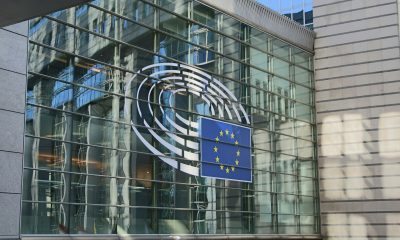Impact Investing
The CSRD Is Having an Impact, a Study by PwC Shows
The study by PwC also shows the challenges of CSRD implementation. 64 percent of the companies surveyed cited technical complexity and resource bottlenecks as hurdles. Half of those surveyed also complained about the enormous time pressure. However, a lack of support from management only plays a role for 14 percent of those surveyed.

At the beginning of 2023, the European Corporate Sustainability Reporting Directive (CSRD) came into effect. According to this directive, companies will have to report on sustainability issues much more comprehensively in the coming years than before.
In addition, many companies are now required to report that were not previously required to report in this way. Across the EU, the number of companies required to report will increase from around 11,600 to around 49,000.
In a study, PwC examined how far companies are with CSRD implementation and intensively surveyed 170 companies in Germany, Austria, Switzerland and the Netherlands.
Read more about the implementation of the CSRD and find other important business news with our companion app Born2Invest.
Majority of companies address CSRD reporting requirements
Although the new reporting requirements will only come into force for many companies in the coming years, the Corporate Sustainability Reporting Directive (CSRD) is already having an impact. In 59 percent of the companies surveyed, CSRD already influences operational decisions. This is not the case for just under a quarter of companies (24 percent), while a good one in seven companies (15 percent) are still unsure about this question.
Of the companies surveyed, 61 percent have already started collecting relevant key performance indicators (KPIs) for CSRD. 58 percent are conducting a scope analysis and 52 percent have created an integrated sustainability strategy. Only 15 percent of companies have not yet started implementing CSRD.
The main responsibility for implementing the new reporting requirements most often lies with the sustainability departments (42 percent). In 30 percent of companies, the accounting department is responsible, while the controlling department takes on this task in 21 percent. The diversity of responsibilities makes it clear that there is no “best solution” and suggests that collaboration between different departments is effective.
Sustainability strategy is usually part of the overall strategy
The study shows that for most companies, sustainability is increasingly becoming an integral part of their actions: 72 percent of the companies surveyed already have a sustainability strategy. 26 percent of those surveyed have not yet. If one exists, 81 percent have it integrated into the overall strategy.
In contrast, before 2021, only 24 percent of companies had a sustainability strategy. This underlines that the CSRD – as well as other regulations such as the EU taxonomy – appear to be having the intended effect.
Challenges in implementing CSRD
The study also shows the challenges of CSRD implementation. 64 percent of those surveyed cited technical complexity and resource bottlenecks as hurdles. Half of those surveyed also complained about the enormous time pressure. However, a lack of support from management only plays a role for 14 percent of those surveyed.
Around half of companies plan to use reporting software solutions to meet CSRD reporting requirements. Only 20 percent do not plan to do this. 28 percent of companies have not yet decided whether to use appropriate software solutions.
The most frequently planned solution is the use of Excel (27 percent). 19 percent plan to use a special sustainability software solution or ERP system. 12 percent of those surveyed plan to use only the software that is already used for financial reporting for sustainability reporting.
Only 14 percent of respondents feel well informed about the available software solutions, while 52 percent of companies still have to work out the differences between the software solutions. 31 percent have not yet dealt with the topic at all.
__
(Featured image by geralt via Pixabay)
DISCLAIMER: This article was written by a third party contributor and does not reflect the opinion of Born2Invest, its management, staff or its associates. Please review our disclaimer for more information.
This article may include forward-looking statements. These forward-looking statements generally are identified by the words “believe,” “project,” “estimate,” “become,” “plan,” “will,” and similar expressions. These forward-looking statements involve known and unknown risks as well as uncertainties, including those discussed in the following cautionary statements and elsewhere in this article and on this site. Although the Company may believe that its expectations are based on reasonable assumptions, the actual results that the Company may achieve may differ materially from any forward-looking statements, which reflect the opinions of the management of the Company only as of the date hereof. Additionally, please make sure to read these important disclosures.
First published in DerBankBlog. A third-party contributor translated and adapted the article from the original. In case of discrepancy, the original will prevail.
Although we made reasonable efforts to provide accurate translations, some parts may be incorrect. Born2Invest assumes no responsibility for errors, omissions or ambiguities in the translations provided on this website. Any person or entity relying on translated content does so at their own risk. Born2Invest is not responsible for losses caused by such reliance on the accuracy or reliability of translated information. If you wish to report an error or inaccuracy in the translation, we encourage you to contact us

-

 Cannabis1 week ago
Cannabis1 week agoCannabis and the Aging Brain: New Research Challenges Old Assumptions
-

 Crowdfunding1 week ago
Crowdfunding1 week agoAWOL Vision’s Aetherion Projectors Raise Millions on Kickstarter
-

 Fintech2 weeks ago
Fintech2 weeks agoFintower Secures €1.5M Seed Funding to Transform Financial Planning
-

 Impact Investing2 days ago
Impact Investing2 days agoItaly’s Listed Companies Reach Strong ESG Compliance, Led by Banks and Utilities

























